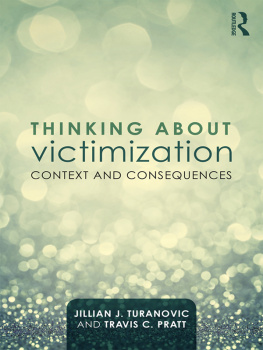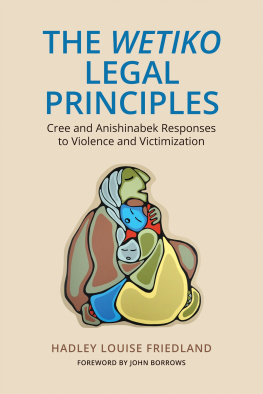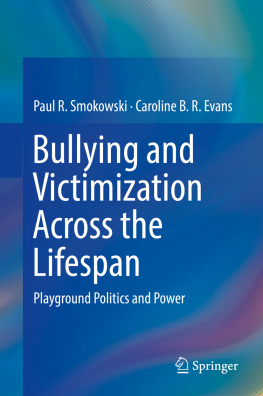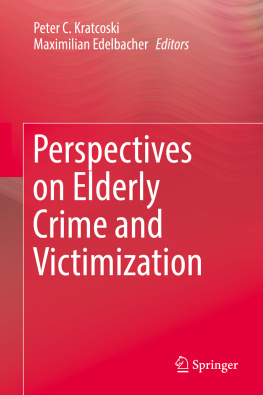Taking a fresh approach, Jillian Turanovic and Travis Pratt analyze victimization across diverse contexts, ranging from the small confines of the prison to the expansive reach of the internet. This volume is rich in theory and scholarship but masterfully written to be accessible to students at all levels. It also is a work of practical relevance, as readers are encouraged to consider the disquieting consequences of victimization and to evaluate the policiesboth effective and foolishproposed to reduce such harm. Put simply, Thinking About Victimization has set the standard for textbooks in this area.
Francis T. Cullen, Distinguished Research Professor Emeritus, University of Cincinnati
Thinking About Victimization
Bringing together cutting-edge theory and research that bridges academic disciplines from criminology and criminal justice, to developmental psychology, sociology, and political science, Thinking About Victimization offers an authoritative, comprehensive, and refreshingly accessible overview of scholarship on the nature, sources, and consequences of victimization.
Written in a lively style with sharp storytelling and an appreciation of international research on victimization, this book is rooted in a healthy respect for criminological history and the foundational works in victimization studies. It provides a detailed account of how different data sources can influence our understanding of victimization; of how the sources of victimizationindividual, situational, and contextualare complicated and varied; and of how the consequences of victimizationpersonal, legal, and politicalare just as complex. This book also engages with contemporary issues such as cybervictimization, intimate partner violence and sexual victimization, prison violence and victimization, and terrorism and state-sponsored violence.
Thinking About Victimization is essential reading for advanced courses in victimization offered in criminology, criminal justice, sociology, social work, and public policy departments. With its unapologetic reliance on theory and research combined with its easy readability, undergraduate and graduate students alike will find much to learn in these pages.
Jillian J. Turanovic is an Assistant Professor in the College of Criminology and Criminal Justice at Florida State University. Her research focuses broadly on victimization and its consequences, criminological theory, and correctional policy. She is the author of a number of peer-reviewed articles that have been published in journals such as Criminology, Journal of Quantitative Criminology, Justice Quarterly, Criminal Justice and Behavior, Journal of Youth and Adolescence, and Journal of Pediatrics. Her most recent work focuses on variability in the effects of adolescent violent victimization on the life course, as well as on the sources of violence and victimization at school.
Travis C. Pratt is a Fellow in the University of Cincinnati Corrections Institute. His research focuses primarily on linking structural theories and individual theories of crime/delinquency and victimization, as well as correctional policy and practice. He is the author of Addicted to Incarceration: Corrections Policy and the Politics of Misinformation in the United States (2019) and Key Ideas in Criminology and Criminal Justice (2011), and he is the author of over 100 peer-reviewed publications that have appeared in outlets such as Criminology, Crime and Justice: A Review of Research, Criminal Justice and Behavior, Journal of Quantitative Criminology, Journal of Research in Crime and Delinquency, and Justice Quarterly. His most recent work focuses on the effects (or lack thereof) of formal sanctions on the behavior of offenders under community supervision, as well as how individuals attitudes concerning the legitimacy of the criminal justice system change over time.
Thinking About Victimization
Context and Consequences
Jillian J. Turanovic and Travis C. Pratt
First published 2019
by Routledge
2 Park Square, Milton Park, Abingdon, Oxon OX14 4RN
and by Routledge
52 Vanderbilt Avenue, New York, NY 10017
Routledge is an imprint of the Taylor & Francis Group, an informa business
2019 Jillian J. Turanovic and Travis C. Pratt
The right of Jillian J. Turanovic and Travis C. Pratt to be identified as authors of this work has been asserted by them in accordance with sections 77 and 78 of the Copyright, Designs and Patents Act 1988.
All rights reserved. No part of this book may be reprinted or reproduced or utilized in any form or by any electronic, mechanical, or other means, now known or hereafter invented, including photocopying and recording, or in any information storage or retrieval system, without permission in writing from the publishers.
Trademark notice: Product or corporate names may be trademarks or registered trademarks, and are used only for identification and explanation without intent to infringe.
British Library Cataloguing-in-Publication Data
A catalogue record for this book is available from the British Library
Library of Congress Cataloging-in-Publication Data
Names: Turanovic, Jillian J., 1985 author. | Pratt, Travis C., author.
Title: Thinking about victimization : context and consequences / Jillian J. Turanovic and Travis C. Pratt.
Description: 1 Edition. | New York : Routledge, 2019.
Identifiers: LCCN 2018056685 (print) | LCCN 2019006554 (ebook) | ISBN 9781315522333 (eBook) | ISBN 9781138697225 (hardback) | ISBN 9781138697232 (pbk.) | ISBN 9781315522333 (ebk)
Subjects: LCSH: Victims of crimes. | Victims of crimesLegal status, laws, etc. | WomenCrimes against.
Classification: LCC HV6250.25 (ebook) | LCC HV6250.25 .T867 2019 (print) | DDC 362.88dc23
LC record available at https://lccn.loc.gov/2018056685
ISBN: 978-1-138-69722-5 (hbk)
ISBN: 978-1-138-69723-2 (pbk)
ISBN: 978-1-315-52233-3 (ebk)
Typeset in Interstate
by Apex CoVantage, LLC
Contents
PART I
SETTING THE STAGE
PART II
THE SOURCES OF VICTIMIZATION
PART III
THE CONSEQUENCES OF VICTIMIZATION
PART IV
SPECIAL TOPICS IN VICTMIZATION
We would like to thank Thomas Sutton and the production team at Routledge/Taylor & Francis for their assistance and patience.
In 2013, we published our first collaborative work on the consequences of victimization (Turanovic & Pratt, 2013). In this study we began with the idea that not everyone will experience victimization in the same way, and that a persons choice of coping strategyone that could be either positive or negative (in the case of this study, substance use)was heavily influenced by their level of self-control, which ultimately influenced the odds that they would engage in offending later on down the line. This study was important because it forced the field of victimization studies to look at the relationship between victimization and offending in a different way.
But we did not stop there. We followed that research up with quite a lengthy roster of empirical studies that we would be guilty of false modesty if we said that they did not push victimization research forward. This work included studies related to patterns of repeat victimization (Turanovic & Pratt, 2014), the relationship between self-control and victimization (Pratt et al., 2014), how strong social ties among youth can mitigate the potential long-term negative consequences of victimization into adulthood (Turanovic & Pratt, 2015), gendered pathways to victimization (Turanovic, Reisig, & Pratt, 2015), theoretical developments in the study of victimization (Pratt & Turanovic, 2016), the long-term consequences of violent victimization among Native American youth (Turanovic & Pratt, 2017), how a classic study concerning the cycle of violence did not replicate very well (Myers et al., 2018), and how structural conditions influence patterns of risky lifestyles and victimization (Turanovic, Pratt, & Piquero, 2018).








